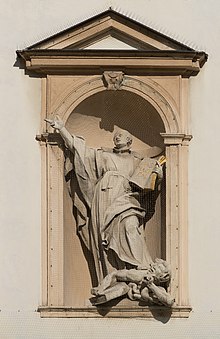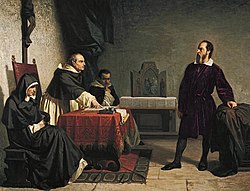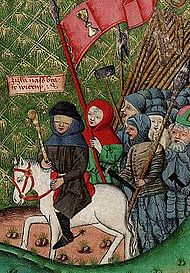Heresy
[3] Heresy is distinct from apostasy, which is the explicit renunciation of one's religion, principles or cause;[4] and from blasphemy, which is an impious utterance or action concerning God or sacred things.By Roman law the Emperor was Pontifex Maximus, the high priest of the College of Pontiffs (Collegium Pontificum) of all recognized religions in ancient Rome.[16][17][18] However, his accusers were excommunicated both by Ambrose of Milan and by Pope Siricius,[19] who opposed Priscillian's heresy, but "believed capital punishment to be inappropriate at best and usually unequivocally evil.[22] The position remained popular in Christian circles well into the 20th century, by theologians such as the Congregationalist cleric Frank Hugh Foster and the Roman Catholic historian Hilaire Belloc, the latter describing it as "the great and enduring heresy of Mohammed.[35] The Church had always dealt harshly with strands of Christianity that it considered heretical, but before the 11th century these tended to centre on individual preachers or small localised sects, like Arianism, Pelagianism, Donatism, Marcionism and Montanism.By the 11th century, more organised groups such as the Patarini, the Dulcinians, the Waldensians and the Cathars were beginning to appear in the towns and cities of northern Italy, southern France and Flanders.[37][38] Heresy was a major justification for the Inquisition (Inquisitio Haereticae Pravitatis, Inquiry on Heretical Perversity) and for the European wars of religion associated with the Protestant Reformation.The Eastern Orthodox Church also rejects the early Christian heresies such as Arianism, Gnosticism, Origenism, Montanism, Judaizers, Marcionism, Docetism, Adoptionism, Nestorianism, Monophysitism, Monothelitism and Iconoclasm.Martin Luther and Philip Melanchthon, who played an instrumental part in the formation of the Lutheran Churches, condemned Johannes Agricola and his doctrine of antinomianism – the belief that Christians were free from the moral law contained in the Ten Commandments – as a heresy."[46] The Augsburg Confession of 1539, which is among the foundational documents of Lutheranism, lists 10 heresies by name which are condemned: Manichaeans, Valentinians, Arians, Eunomians, Mohammedans, Samosatenes, Pelagians, Anabaptists, Donatists and "certain Jewish opinions".During the thirty-eight years of Henry VIII's reign, about sixty heretics, mainly Protestants, were executed and a rather greater number of Catholics lost their lives on grounds of political offences such as treason, notably Sir Thomas More and Cardinal John Fisher, for refusing to accept the king's supremacy over the Church in England.[52] When Elizabeth I came to the throne, the concept of heresy was retained in theory but severely restricted by the 1559 Act of Supremacy and the one hundred and eighty or so Catholics who were executed in the forty-five years of her reign were put to death because they were considered members of "a subversive fifth column.[54] Although the charge was technically one of "blasphemy" there was one later execution in Scotland (still at that date an entirely independent kingdom) when in 1697 Thomas Aikenhead was accused, among other things, of denying the doctrine of the Trinity.In addition, the more right-wing groups within Orthodox Judaism hold that all Jews who reject the simple meaning of Maimonides's 13 principles of Jewish faith are heretics.Although Zoroastrianism has had an historical tolerance for other religions, it also held sects like Zurvanism and Mazdakism heretical to its main dogma and has violently persecuted them, such as burying Mazdakians with their feet upright as "human gardens."[71] In other contexts the term does not necessarily have pejorative overtones and may even be complimentary when used, in areas where innovation is welcome, of ideas that are in fundamental disagreement with the status quo in any practice and branch of knowledge.While the details of his work are in scientific disrepute, the concept of catastrophic change (extinction event and punctuated equilibrium) has gained acceptance in recent decades.






Heretical (website)Heretic (disambiguation)Heresy (disambiguation)HearsayThe GospelSerpentGustaf Vasa ChurchStockholm, SwedenBurchard PrechtViennaSaint Ignatius of LoyolapantheisticAmalricianPhilip II AugustusGibbet of MontfauconTempleGrandes Chroniques de Francereligious lawChristianityJudaismexcommunicationdeath penaltyapostasyblasphemyHeresiologyAncient GreekheresiarchMartin LutherPope Leo Xpapal bullDecet Romanum PontificemHeresy in ChristianityTitus 3TertullianJesus was not the ChristIrenaeusContra HaeresesorthodoxGnosticsapostolic successionConstantine the GreatLiciniusEdict of MilanPontifex MaximusCollege of Pontiffsancient Romeecumenical councilsEdict of ThessalonicaTheodosius Istate church of the Roman EmpirePriscillianTheodosius IISaint John of Damascusmedieval Christian views on MuhammadFrank Hugh FosterHilaire BellocReformationMichael ServetusReformed ChurchCatholic ChurchHoly TrinityCayetano RipollCongregation for the Doctrine of the FaithPope Benedict XVIDominus IesusHeresy in the Catholic ChurchWaldensiansMérindolCodex JustinianusArianismPelagianismDonatismMarcionismMontanismManichaeanPauliciansBogomilsPatariniDulciniansCatharsCathar CrusadeLanguedocInquisitionEuropean wars of religionProtestant ReformationCristiano BantiRoman InquisitionGalileo Galileibrought before the Inquisitionabjuredhouse arrestuniversePope Gregory IHoly SpiritRoman-Christian lawHussiteCrusadesEastern Orthodox Christianityfirst seven Ecumenical CouncilsGreat SchismEastern Orthodox ChurchGnosticismOrigenismJudaizersDocetismAdoptionismNestorianismMonophysitismMonothelitismIconoclasmPhilip MelanchthonLutheran ChurchesJohannes AgricolaantinomianismTen CommandmentsAugsburg ConfessionManichaeansValentiniansAriansEunomiansMohammedansSamosatenesPelagiansAnabaptistsDonatists39 Articles
